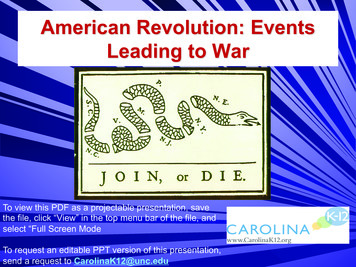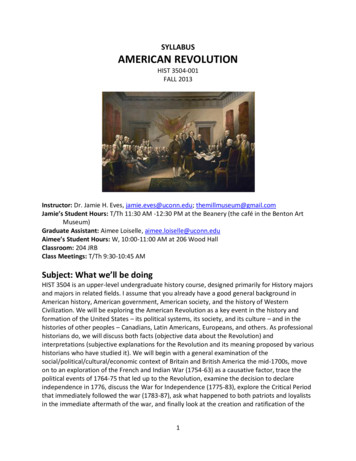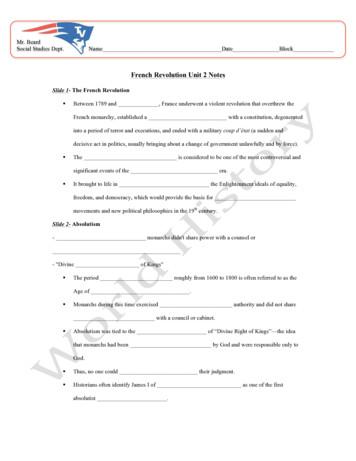American Revolution: Events Leading To War
American Revolution: EventsLeading to WarTo view this PDF as a projectable presentation, savethe file, click “View” in the top menu bar of the file, andselect “Full Screen ModeTo request an editable PPT version of this presentation,send a request to CarolinaK12@unc.edu
1660: The Navigation ActsBritish Action:– Designed to keeptrade in England andsupport mercantilism– Colonists could onlytrade goods withEngland– All colonial ships muststop in a British harborbefore going toanother countryColonial Response:– Ignored them(profitable to trade withother countries)– Salutary Neglect(relaxed enforcementfor continued loyalty)
The French and Indian WarFrench empire collided w/ British empireCompeting over the Ohio River Valley
Treaty of ParisProclamation Line of 1763 Britain claimed landeast of the MississippiRiver Proclamation Line:banned all settlementwest of AppalachianMts. (to ease tensionsw/ N.A.) IncreasedIndependent Spirit
Writs of AssistanceBritish Action:– Designed to crackdown on colonialsmuggling– Search warrants thatallowed British officialsto search any place,seize anything at anytimeColonial Response:– Outraged themerchants of Boston
Britain’s New Policy for ColonialAmericaNew Policy had three basic objectives:– Place the colonies under strict British politicaland economic control– Make the colonies respect and obey Britishlaws– Make the colonies pay their part inmaintaining the British Empire
1764: Sugar ActBritish Action:– Cut the tax onmolasses but raised iton other goods suchas textiles, wine,coffee, indigo, andsugar– Strengthened ViceAdmiralty courtsCases decided by asingle judge, not a juryColonial Response:– First time a tax hadbeen passed to raiserevenue rather thanregulate trade– Colonial merchantsprotested theincreased duties
1765: Quartering ActBritish Action:– Purpose to keeptroops in the coloniesand reduce the cost– Colonists had to keeptroops in their homesColonial Response:– Colonists did not getalong with army anddid not want themthere permanently
1765: The Stamp ActBritish Action:– Taxed all documents, newspapers,and playing cards by forcing coloniststo place a special stamp on the items– Direct taxColonial Reaction:– Sons of Liberty– Harassed stampdistributors– Boycotted (a collectiverefusal to use, buy ordeal with) English goods– Stamp Act Congressissued a Declaration ofRights and Grievances(9 legislatures)
Stamp Act: British ResponseParliament repealed the Stamp Act– Boycotts so successful not one stamp wasever soldDeclaratory Act – asserted Parliament’sright to make laws that “bind the coloniesin all cases whatsoever”
1767: The Townshend ActsBritish Action:– Put tax on goods suchas paper, glass, paint,and tea– Revenue raised wouldbe to pay salaries ofBritish officials in thecoloniesColonial Reaction– Organize new boycottof goods– Protest “No taxationwithout representation”– Demonstrations andclashes betweencolonists and soldiers– Women get involved inprotests
Press ReleaseWrite a press release as if you were aBritish official explaining why the newBritish policy of strict control and taxationis necessary.
March 3, 1770: The BostonMassacre
1772: Committees ofCorrespondence formedStarted by SamuelAdamsUsed to passinformation betweenthe coloniesIt was a secretorganization
1773: Tea ActParliament repealed Townshend Actsexcept for the tax on tea– In the first year the taxes raised 295 pounds,but the cost of sending British troops toBoston was 170,000 poundsAllowed the East India Tea Company tosell tea without the tax to make it cheaper– Had been hurt badly by the boycotts
Dec. 16, 1773: Boston TeaParty
Spring 1774: The Intolerable ActsDesigned to punish the colonists for TeaPartyClosed the port at BostonBrought British soldiers to England fortrialsNo town meetings allowed inMassachusetts – Boston under militaryrule– Trying to isolate Massachusetts, but onlystrengthened the colonies unity
1774: First ContinentalCongressMet in PhiladelphiaAll colonies had representatives exceptGeorgiaDivided on the issue of declaringindependenceSent Declaration of Rights and Grievancesto King George III– Defended colonies’ right to run their ownaffairs– Supported the protests in Massachusetts
April 19, 1775Shot heard round the world fired at theBattle of LexingtonStart of the revolutionary warWatch this short video about the “shot heardround the world”:http://earlyamerica.com/shot heard.htm
American Revolution: Events Leading to War To view this PDF as a projectable presentation, save the file, click “View” in the top menu bar of the file, and select “Full Screen Mode To request an editable PPT version of this presentation, send a request to CarolinaK12@unc.edu. 1660: The Navigation Acts British Action: – Designed to keep trade in England and support mercantilism .
Revolution: Between the 16th and 18th centuries, a series of revolutions helped usher in the modern era of Western history First was a revolution in understanding, called the Scientific Revolution Second was a revolution of ideas, called the Enlightenment Third was a revolution in action—the American Revolution Previewing Themes
c. Describe the major events of the American Revolution and explain the factors leading to American victory and British defeat; include the Battles of Lexington and Concord, Saratoga, and Yorktown. d. Describe key individuals in the American Revolution with emphasis on King George III, George Washington, Benjamin Franklin, Thomas Jefferson, Benedict Arnold, Patrick Henry, and John Adams .
11.The Enlightenment and the American Revolution were both major influences on 19th-century uprisings in. Latin American Political Revolution Practice Questions Base your answers to questions 12 and 13 on for the information below A)Emiliano Zapata B)Simón Bolívar . Revolution and the French Revolution have the greatest influence during the .
American Revolution were the same white guys who controlled it after the American Revolution. And this leads us to the second, and more important way that as a revolution, the American one falls a bit short. So, if you've ever studied American history, you're probably familiar with the greatest line in the Declaration of Independence: “We hold these truths to be self-evident, that all men .
The American Revolution Unit 1: Homework Lesson Lesson Content Homework Practice Due In Anticipated Date* 9 Students read a new informational text about Native Americans during the American Revolution for gist. 1. Language Dive Practice: “American Indians and the American Revolution”
Revolution itself, and the events that immediately followed it. 2. Theoretical tools to help you interpret (explain/analyze) the American Revolution: You will learn basic revolutionary theory as it has been developed by historians and political scientists, and apply it to the American Revolution. 3.
The Glorious Revolution, the American Revolution, and the French Revolution had far-reaching consequences as they challenged the institutions that shaped the political structure of the world. Each attempted to establish democratic principles of government, including limiting the power of the government and extending rights to the governed.
French Revolution Unit 2 Notes Slide 1- The French Revolution ! Between 1789 and _, France underwent a violent revolution that overthrew the French monarchy, established a _ with a constitution, degenerated . This would prove to be another _ leading to a revolution. Slide 9- The Enlightenment - New ideas about _ and government .






















